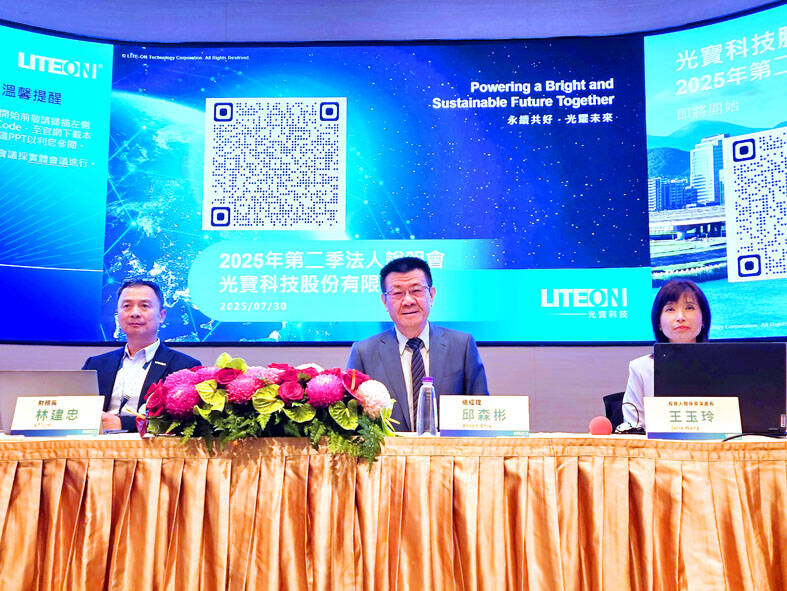Lite-On Technology Corp (光寶科技), a maker of electronic components, expects third-quarter revenue to grow sequentially and annually on the back of continued demand from cloud computing and artificial intelligence (AI) data centers, Lite-On president Anson Chiu (邱森彬) said yesterday.
However, the appreciation of the New Taiwan dollar against the US dollar could reduce third-quarter revenue by as much as 10 percent, with actual growth hinging on whether the firm’s performance offsets the impact, Chiu said.
The sharp appreciation of the local currency reduced last quarter’s revenue by 4 percent, gross margin by 0.2 percentage points and operating margin by 0.5 percentage points, he said.

Photo: CNA
Second-quarter revenue rose 10.99 percent quarterly and 21 percent annually to NT$40.42 billion (US$1.36 billion), driven by a higher share of high-value business segments and high demand for cloud computing.
In the April-to-June quarter, sales in the cloud computing and AI of Things segment rose 37 percent year-on-year to NT$16.73 billion, accounting for 41 percent of total sales, followed by the information technology and consumer electronics segment at 40 percent of total sales, and the optoelectronics segment at 19 percent.
Growth this quarter is expected to be driven by the cloud computing and AI segment, supported by strong demand for battery backup units (BBU) and high-end power shelves used in data centers, while the other two segments would see modest gains, Chiu said.
Net profit in the second quarter fell 8.7 percent quarter-on-quarter to NT$3.16 billion, but rose 1 percent year-on-year. Earnings per share improved to NT$1.39 from NT$1.51 in the previous quarter and NT$1.36 in the second quarter last year.
Operating margin was 9.2 percent, down 0.9 percentage points from the previous quarter and 0.7 points year-on-year, while gross margin fell to 22.1 percent, down 0.5 percentage points quarter-on-quarter and 0.1 percentage points year-on-year.
The sequential declines in margins were due to exchange rate fluctuations, NT$400 million in prepaid 10 percent tariffs for clients on direct US shipments, and increased research and development spending on higher value-added products, Chiu said, adding that an ongoing shift of production from China to Vietnam would also add to near-term expenses.
Lite-On has 40 percent of its production capacity in China, 40 percent in Taiwan and 20 percent in Japan, Chiu said.
The company’s facility in Dallas, Texas, produces power shelves and chargers.
It added two BBU production lines there earlier this year and is building two more with expansion set for completion in the third quarter, he said.
Amid strong data center demand, the company aims to have AI-related business account for more than 20 percent of total revenue this year, up from about 15 percent in the first half of the year.
Lite-On plans to begin shipping its next-generation cooling distribution units as early as next quarter, with the segment expected to contribute 5 percent of revenue next year, Chiu said.
The company is also developing a power supply unit capable of delivering more than 24 kilowatts per module to meet the high power requirements of GB300 servers, he said.

RUN IT BACK: A succesful first project working with hyperscalers to design chips encouraged MediaTek to start a second project, aiming to hit stride in 2028 MediaTek Inc (聯發科), the world’s biggest smartphone chip supplier, yesterday said it is engaging a second hyperscaler to help design artificial intelligence (AI) accelerators used in data centers following a similar project expected to generate revenue streams soon. The first AI accelerator project is to bring in US$1 billion revenue next year and several billion US dollars more in 2027, MediaTek chief executive officer Rick Tsai (蔡力行) told a virtual investor conference yesterday. The second AI accelerator project is expected to contribute to revenue beginning in 2028, Tsai said. MediaTek yesterday raised its revenue forecast for the global AI accelerator used

TEMPORARY TRUCE: China has made concessions to ease rare earth trade controls, among others, while Washington holds fire on a 100% tariff on all Chinese goods China is effectively suspending implementation of additional export controls on rare earth metals and terminating investigations targeting US companies in the semiconductor supply chain, the White House announced. The White House on Saturday issued a fact sheet outlining some details of the trade pact agreed to earlier in the week by US President Donald Trump and Chinese President Xi Jinping (習近平) that aimed to ease tensions between the world’s two largest economies. Under the deal, China is to issue general licenses valid for exports of rare earths, gallium, germanium, antimony and graphite “for the benefit of US end users and their suppliers

Dutch chipmaker Nexperia BV’s China unit yesterday said that it had established sufficient inventories of finished goods and works-in-progress, and that its supply chain remained secure and stable after its parent halted wafer supplies. The Dutch company suspended supplies of wafers to its Chinese assembly plant a week ago, calling it “a direct consequence of the local management’s recent failure to comply with the agreed contractual payment terms,” Reuters reported on Friday last week. Its China unit called Nexperia’s suspension “unilateral” and “extremely irresponsible,” adding that the Dutch parent’s claim about contractual payment was “misleading and highly deceptive,” according to a statement

Artificial intelligence (AI) giant Nvidia Corp’s most advanced chips would be reserved for US companies and kept out of China and other countries, US President Donald Trump said. During an interview that aired on Sunday on CBS’ 60 Minutes program and in comments to reporters aboard Air Force One, Trump said only US customers should have access to the top-end Blackwell chips offered by Nvidia, the world’s most valuable company by market capitalization. “The most advanced, we will not let anybody have them other than the United States,” he told CBS, echoing remarks made earlier to reporters as he returned to Washington